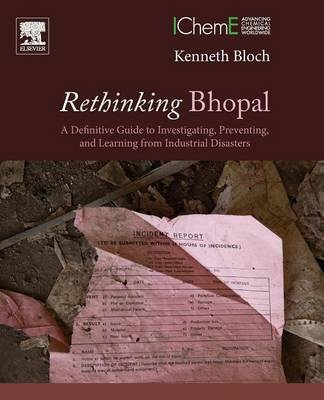
Rethinking Bhopal
Elsevier Science Publishing Co Inc (Verlag)
978-0-12-803778-2 (ISBN)
The seeds that unified PSM on a global scale were planted in Bhopal, India on December 3, 1984. Since then, considerable progress has been made to protect both workers and communities from catastrophic industrial failures. Industry acknowledges its responsibility to create value with accrued operating experience and that using information received from previous failures is a direct way to prevent future incidents. With this principle in mind, Bloch evaluates modern references related to the Bhopal Disaster, using recognized industrial asset reliability and incident investigation concepts.
The practice of objective incident investigation offers a compelling insight into specific decisions and actions that resulted in history’s worst industrial disaster. Recording a fully transparent sequence of events promotes a personal sense of accountability for anyone involved in the manufacturing industry. Lessons learned can be immediately implemented by those with direct PSM, management, engineering, and operating responsibilities. Case histories demonstrate how patterns observed in the timeline leading up to the Bhopal Disaster can be detected in modern incidents and by recognizing these patterns in present-day processes avoids counterproductive operating decisions and unprecedented destruction.
This text is instrumental in helping existing organizations re-evaluate their own exposures and risks, and would be a valuable read for any member of a process safety management team. Rethinking Bhopal: A Definitive Guide to Investigating, Preventing, and Learning from Industrial Disasters provides an expansion of knowledge and understanding for the novice in PSM while also providing depth and application considerations to challenge more experienced industry professionals. Note: All royalties from this book go to the Process Safety Heritage Trust Scholarship at Lamar University in Beaumont, Texas, USA.
Kenneth P. Bloch is a Senior HES Professional who specializes in petrochemical industry incident investigation and failure analysis. His experience includes thirty years of downstream service in maintenance, PSM, technical, and operations roles. He speaks regularly at AFPM, API, and AIChE process safety symposiums about experiences that help prevent recurring process safety failures throughout the manufacturing industry. Mr. Bloch graduated with honors from Lamar University in Beaumont, Texas with an Environmental Science Degree in 1988. Relevant publications include:• The Bhopal Disaster: understanding the impact of unreliable machinery, Hydrocarbon Processing Magazine, June 2012, pp 73-76• Update your reliability performance to meet process safety expectations, Hydrocarbon Processing Magazine, June 2011, pp 45-53• Process safety management lessons learned from a petroleum refinery spent caustic tank explosion, Process Safety Progress, December 2010, pp 332-339
Part 1: Process Reliability
Chapter 1: Industrial Learning Processes
Chapter 2: Equipment Reliability Principles
Chapter 3: Incident Investigation
Chapter 4: Role Statement
Chapter 5: Spent Caustic Tank Explosion: A Case Study in Inherently Safer Design
Part 2: Research and Development
Chapter 6: Inventing Solutions
Chapter 7: Product Manufacturing and Distribution
Chapter 8: Process Selection
Chapter 9: Industry Compliance
Chapter 10: Production Commitments
Part 3: Process Configuration
Chapter 11: Licensing
Chapter 12: Factory Construction
Chapter 13: Process Hazard Awareness and Analysis
Chapter 14: Commissioning Phase
Chapter 15: Repeat Mechanical Seal Failures: A Case Study in Pump Reliability Improvement
Part 4: Operations and Production
Chapter 16: Management of Change
Chapter 17: Process Isolation and Containment
Chapter 18: Employee Participation
Chapter 19: Compliance Audits
Chapter 20: Process Optimization
Chapter 21: Maintenance Failure
Chapter 22: Human Error
Part 5: Lessons Learned
Chapter 23: Crude Unit Fire: A Case Study in Human Error
Chapter 24: Reliability Commitment
| Erscheinungsdatum | 10.06.2016 |
|---|---|
| Sprache | englisch |
| Maße | 191 x 235 mm |
| Gewicht | 1020 g |
| Themenwelt | Technik ► Elektrotechnik / Energietechnik |
| Technik ► Umwelttechnik / Biotechnologie | |
| ISBN-10 | 0-12-803778-4 / 0128037784 |
| ISBN-13 | 978-0-12-803778-2 / 9780128037782 |
| Zustand | Neuware |
| Haben Sie eine Frage zum Produkt? |
aus dem Bereich


